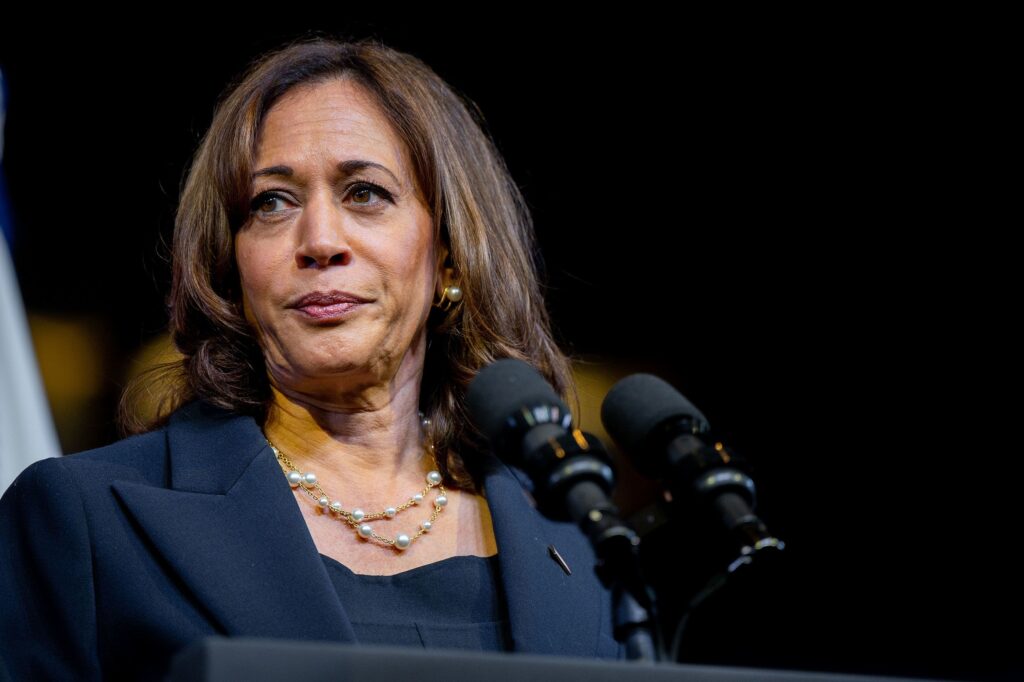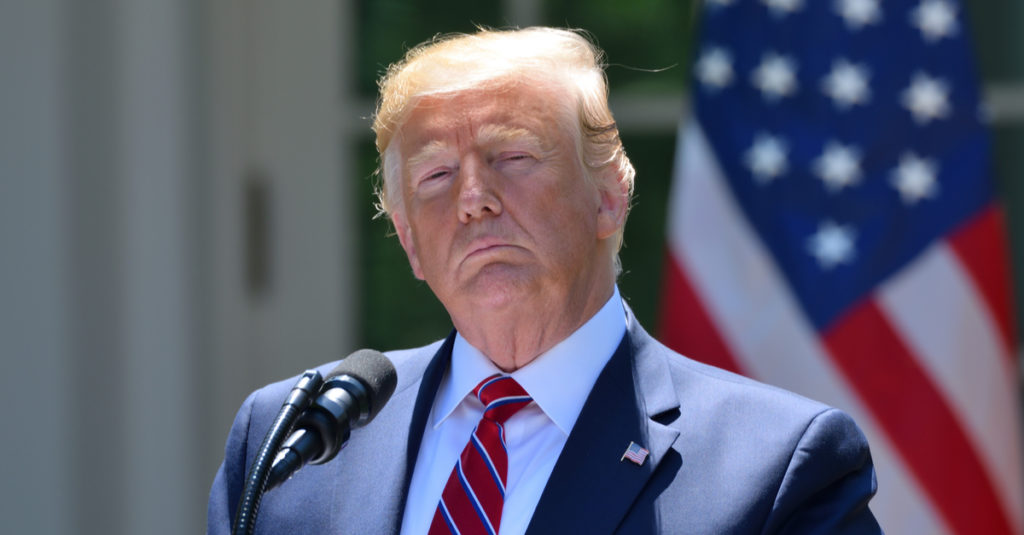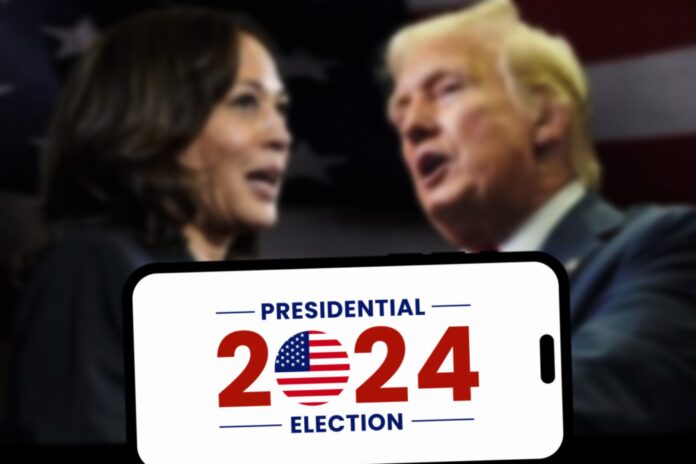Blogger Najm Al-Din says American Muslims have largely decided to abandon the Democrats and Republicans ahead of the U.S. elections, but urges Muslims to consider an Islamic alternative rather than automatically voting for a third party candidate.
With the U.S. presidential elections on November 4 fast approaching, the bipartisan support for Israel’s genocide in Gaza has led a significant portion of America’s Muslim electorate – including a key margin of voters in swing states – to mobilise outside of the two-party system.
But before exploring the alternatives espoused by many Muslim voters, let’s briefly recap the history and recent events which have contributed towards this new political trajectory.
Democrats
Historically, the Democratic party supported Israel from the early 20th century, which witnessed a high-water mark in antisemitic currents across many parts of the world.
In the aftermath of the Second World War, championing Israel was consistent with the broad consensus on the global Left and Roosevelt’s victory over Nazism secured long-term Jewish support for the Democrats.
Although traditionally viewed as a Republican constituency, there has been a shift in the allegiances of America’s second and third generation Muslims, with many leaning towards the Democratic Party after 9/11, given the rampant Islamophobia, hawkish foreign policy and resurgence of anti-immigrant sentiment in Republican administrations.
Subscribe to our newsletter and stay updated on the latest news and updates from around the Muslim world!
However, Biden’s handling of the Gaza crisis has alienated large swathes of this demographic, many of whom are disengaging from the two-party system altogether.

Editorial credit: Naresh79 / Shutterstock.com
Given the Democrats’ refusal to unequivocally condemn Israel for its atrocities, vetoing two UN resolutions calling for a ceasefire and agreeing to over a hundred arms sales to Israel (many of which took place without congressional authorisation), Harris’ prospects for swaying Muslim voters has been dealt a devastating blow.
Despite the progressive wing of the party voicing discontent with Netanyahu’s prosecution of the war, the months following the October 7th attack left no doubts as to where the allegiance of senior officials lay, with Biden pledging “ironclad” support for the Zionist regime, while Defence Secretary Lloyd Austin and House Democratic leader Hakeem Jeffries doubled down on their party’s commitment to Israel’s security, even after its abuse of international law was acknowledged by the International Court of Justice as well as advocacy groups like Amnesty International and Human Rights Watch.
While the Democrats are far from united over Netanyahu and have entertained the idea of conditioning military aid to the Zionists, they reassured Jewish voters that their contention with right wing hawks in Tel Aviv will never compromise America’s role as a guarantor of Israel’s security and reiterated their commitment to the preservation of Zionism.
Suggestions that the Harris-Walz administration is about to radically change course with Israel are overblown, with the past year demonstrating how any apparent shift in tone is rarely accompanied by a genuine will to impose tangible consequences for Israel’s flagrant violations of international law.
While some administration officials publicly berated Netanyahu for blocking aid to Gaza and expanding West Bank settlements, condemnations ring hollow when the same politicians revert to the centrist pro-Israel position which has characterised the party for decades.
Kamala Harris
Years before inheriting the Democratic nomination, Harris condemned a UN Security Council Resolution denouncing Israel’s illegal settlements in the West Bank and pandered to the pro-Israel lobby soon after being elected to the Senate, even when radical leftists in the party were slowly distancing themselves from the fundraising juggernaut AIPAC (American Israel Public Affairs Committee).
Today, Harris’ concern about the scale of suffering in Gaza amounts to little more than an empty platitude, seeing as she already rejected claims of supporting an arms embargo on Israel.
In addition to opposing the BDS movement, denouncing pro-Palestinian protesters and promoting a party platform undermining the efforts of a minority of far-left democrats advocating a tougher stance on Israel, Harris has made no secret of bolstering the anti-Iran coalition and ensuring that Israel possesses the qualitative military edge which is vital to U.S. geostrategic interests in the Middle East.
Although her national security advisor bemoaned the costs associated with U.S. interventionism, he is also committed to expanding Israel’s missile defence systems and broadening cybersecurity cooperation as part of reviving the strategic relationship between the U.S. and Israel.
Having secured the backing of several Zionist interest groups in her presidential bid, Harris’ attempts to triangulate between the various cracks in the party regarding Netanyahu and walk a tightrope emerging from the rift between moderates and progressives will not dupe Muslim voters who have seen through her charade of assuaging pro-Palestinian democrats, by empathising with the people whose destruction she is aiding and abetting.
Republicans
Meanwhile, the Republicans have been reflexively supportive of Israel throughout the presidential campaign.
Historically, the GOP’s pro-Israel stance has been influenced by the increasing representation of the evangelical right in Republican ranks.

Editorial credit: Evan El-Amin
Evangelicals frame the Israel-Palestine conflict in eschatological terms and believe Israel to be the historic birthright of the Jewish people and to whom the land must be restored as a precursor to the second coming of Jesus (pbuh).
The unflinching Republican support for Israel is also explained by the neoconservative current which made inroads into the party during the Cold War, when there was a fear of the Soviet Union emerging as the chief power broker in the resource-rich Middle East. U.S. assurances for Israel’s security was deemed essential for Washington’s strategic footprint in West Asia and thwarting any Communist sphere of influence in the region.
The ideological alignment between evangelical Christian-Zionism and neoconservatism strengthened in the aftermath of 9/11, when neocons revived Huntington’s “Clash of Civilisations” thesis and percolated pro-Israel policies into the Republican agenda, as it dovetailed neatly with their belief in America’s indispensable right to leverage unilateral power and launch pre-emptive wars to promote geostrategic interests.
This helps to understand why support for Israel is non-negotiable in the GOP.
Donald Trump
While Trump’s America-First isolationist rhetoric has caused some consternation in Tel Aviv and questions remain about his readiness to replenish Israel’s missile defence systems, the former U.S. President has pledged unconditional support for the Zionist regime, whilst sniping at his rivals for abandoning the cause.
Casting himself as Israel’s protector, the Republican nominee has not even upheld the pretence of endorsing the political aspirations of Palestinians and is less upbeat about a two-state solution.
Having recognised Jerusalem as the capital of Israel, brokered the Abraham Accords, recognised Israel’s control over the Golan Heights and moved the U.S. embassy from Tel Aviv to Jerusalem during his first term in office, Trump recently questioned the sanity of any Jew who was voting for the Democrats and used the presidential debates to play on evangelical sensibilities, criticise Harris for demanding a ceasefire and appease the pro-Israel lobby by decrying what he perceives as the Democrats’ insufficient commitment towards the occupying entity.
A third way
With the Republicans and Democrats alienating America’s Muslim electorate, many have considered a change of tact by endorsing third-party and independent candidates to punish the pro-Israeli duopoly inside the Beltway.
Much like their co-religionists in Britain, America’s Muslim constituencies are voting strategically to influence national elections and have been spurred by a coalition of umbrella organisations and scholars to leverage their sizable populations in key swing states, by only endorsing candidates who support a ceasefire in Gaza and arms embargo against Israel.
Having squandered the Muslim vote, the accumulating failures of Washington’s Gaza policy and stubborn support for Israel which remains an inviolable orthodoxy in both parties could prove decisive in battleground states including Arizona, Michigan and Wisconsin, where the Green Party’s Jill Stein leads Harris in the polls and has emerged as a popular choice given her opposition to Israel’s genocide.
The Islamic solution
As much as I sympathise with this historic shift in voter patterns and applaud the growing number of Muslims who are no longer ensnared by the virtue-signalling left, I appeal on the scholars in America to think beyond registering a protest vote and begin addressing a solution to the genocide which is anchored to the primary sources of Islam.
Firstly, the scholars across the Atlantic must inspire a paradigmatic shift in the political consciousness of America’s Muslims by reminding them of the inherent contradiction between a secular democracy where the powers of legislative supremacy are vested in Congress and the Islamic ruling system where sovereignty is the exclusive right of Allah SWT.
Muslims in the U.S. should be alerted to this crucial distinction, so they may become harbingers of a new era in geopolitics, by centring their political activism, outreach and intellectual struggle around the focal objective of re-establishing Allah’s sovereignty on this earth and restoring Islam as a comprehensive deen for mankind, which offers proscriptions, guidance and counsel in the realms of economics, law, warfare and the vast sum of human affairs.
Once the religious imperative to rule by what Allah revealed is recognised as an act of worship and fundamental to the manifestation of Islamic monotheism, Muslims will naturally arbitrate to the Quran, Sunnah and Islam’s rich juristic corpus when seeking solutions to matters of vital concern to the Ummah, such as the occupation of Palestine.
So what exactly is the Islamic solution?
The consensus of all Islamic schools of thought is that any Muslim territory under occupation must be physically liberated, a duty which is mandatory on those who possess the sufficient means, with the objective of uprooting oppression, reinstating justice and implementing the Islamic law and order to make the word of Allah exalted.
According to the Shari’ah, this responsibility typically falls on the executive head of the Islamic ruling system (Khalifah), who is tasked with mobilising an army to deter aggression and restore any occupied territory previously under sovereign Islamic rule to its original status.
Unless the Ummah recognises the fundamental conflict between the secular rules-based order and Islamic law and develops a long-term strategy to harness the material resources and intellectual capital at our disposal to unify Muslim countries under a transcontinental Caliphate with binding security agreements, there will be no meaningful change to the plight of the Gazans.

It should have dawned on us by now that the warmongering elites presiding over Israel’s genocide will tolerate dissent at home, as it upholds the veneer of freedom and channels our political energies towards actions which are incapable of significantly altering realities on the ground.
Allowing opposition to flourish is a form of strategic entrapment, as pro-Palestinian activists can only pursue actions within a set of narrow parameters set by the genocide enablers, allowing them to manage the scope and absorb the impact of any organic uprising.
Third party and independent candidates offer a false sense of optimism as they cannot operate outside of the toothless political institutions and security architecture of the international rules-based order, which have been cynically exploited by the strong-arm tactics of Israel and other purveyors of state-sponsored terrorism.
Granting citizens the right to collectively organise around a “third way” ultimately pacifies the opposition, as the new vanguards of change are co-opted through their integration into a system which neutralises their potential for ushering a root and branch overhaul of the system, while directing their anti-establishment efforts into more controlled and manageable forms of political opposition, seeing as they lack support networks and infrastructure to leverage their agendas.
If the Muslim world is serious about liberating Palestine and inducing a meaningful shift in the power structure which makes the violence against our people possible, it must reorient its politics by viewing the crisis through Islamic filters and realise how proposals to end the conflict derived from outside of the Shari’ah obstruct Islamic solutions from gaining momentum.























